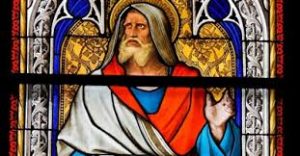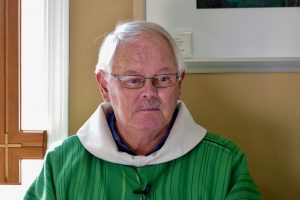Called to do Metanoia – Memorial: St. Jean Vianney
(Jer 26:11-16, 24; Ps 69; Mt 14:1-12)
*********************************************
“Now therefore, amend your ways and your doings, and obey the voice of the Lord your God…”
Today’s liturgy invites us be prophetic – to speak the truth of repentance, to do metanoia and call others to conversion.
The prophet Jeremiah fearlessly confronted the Israelites, preached repentance to them, called them to amend their ways, and to obey the voice of the Lord their God. For that he was condemned to death by “the priests and the prophets,” those most invested in the self-serving religious system they had constructed in collusion with the occupying Romans. As it is today, so often it is the whistle-blower, the one who courageously points out wrong-doing and injustice, who is unfairly victimized and blamed.

The prophet Jeremiah
Jeremiah stands his ground, however, and insists it is the Lord who put those precise words in his ears. Interestingly, there is a sudden shift in tone and mood – a conversion of minds and hearts in at least the officials and the people, who protest that unjust ruling of a death sentence, so Jeremiah’s life is spared.
What caused such a change of heart? It would have to be the Holy Spirit who helped them accept Jeremiah’s cutting message had indeed come from the heart of God. It was the Spirit who helped them change their course of action.

That’s how the Holy Spirit wants to help us today. The Spirit can change our hearts in unexpected ways, just as she did for the ancient Jews. She can catch us just as we’re about to share in some gossip, and urge us to stay quiet. She can help us see a difficult family member with new eyes. She can remind us that it has been a few days since we prayed.
We may feel some unrest or tension about something today. We may have a nagging sense God wants us to think differently about a decision facing us. The Spirit wants to help us think with the mind of Christ today. How does this happen?
There is no one-size-fits-all formula, but it always helps to get in the habit of slowing down and listening for the quiet voice of the Spirit when we are feeling unsettled, especially through contemplative prayer. We can take a few moments to ask if our thoughts reflect the character of Jesus, of if there is something he wants to say to us. It doesn’t take long, and we need not expect the heavens to part every time we do this. But over time, we’ll get used to hearing the Spirit’s gentle voice, and we’ll find the grace we need to follow the Spirit’s lead.

Presentation of the Book of the Gospels at my ordination 2005
In the gospel, John the Baptist, like his ancestor Jeremiah, preached repentance to King Herod, who out of false pride and fear, refused to repent, to change his mind, and had John beheaded to please his wife and her daughter. It is interesting that my ordination to the episcopacy on August 29th2005 happened to be on the feast of the beheading of John the Baptist – not something we wanted to highlight at that particular event! The prophetic message is to repentance – a turn of 180%, change, conversion. It can be hard to accept, and dangerous when not accepted.

John the Baptist
But there is more to the word “repentance” than just changing behavior. Ron Rolheiser, in his recent meditation entitled From Paranoia to Metanoia, claims “it’s significant the first word out of Jesus’ mouth in the Synoptic Gospels is the word, metanoia. Jesus begins his ministry with these words: “Repent [metanoia] and believe in the good news” and that, in capsule, is a summary of his entire message.

Ron Rolheiser OMI
The word, metanoia, comes from two Greek words: Meta, meaning above; and Nous, meaning mind. Metanoia invites us to move above our normal instincts, into a bigger mind, into a mind which rises above the proclivity for self-interest and self-protection which so frequently trigger feelings of bitterness, negativity, and lack of empathy inside us.
Metanoia invites us to meet all situations, however unfair they may seem, with understanding and an empathic heart. Moreover, metanoia stands in contrast to paranoia. In essence, metanoia is “non-paranoia”, so that Jesus’ opening words in the Synoptic Gospels might be better rendered: Be un-paranoid and believe that it is good news. Live in trust!”
Today, the Church honors Sat. Jean-Baptiste Vianney, who was a specialist in the area of metanoia. The name of this French priest may be unfamiliar to many but his title is known around the world: the Curé of Ars. He was the son of a peasant farmer, and a slow and unpromising candidate for the priesthood: he was eventually ordained in 1815 on account of his devoutness rather than any achievement or promise.

St Jean-Marie Vianney
In 1818 he was sent to be the parish priest of Ars-en-Dombes, an isolated village some distance from Lyon where most of the people were not interested in religion or God. He remained there for the rest of his life because his parishioners would not let him leave. He was a noted preacher, and a celebrated confessor: such was his fame, and his reputation for insight into his penitents’ souls and their futures, that he had to spend up to eighteen hours a day in the confessional. People would cut pieces from his clothing and his hair as he walked by. For 30 years he served all who came to him: people were healed and converted, and many were given appropriate words of wisdom or advice even before they had explained their predicament.
When he died in 1859 at the age of 73, John Vianney already had the reputation of being a saint. He was canonized in 1925 and is patron of parish priests. The tens of thousands of people who came to visit this obscure parish priest turned Ars into a place of pilgrimage. The French State recognized his eminence by awarding him the medal of the Légion d’Honneur in 1848, which he sold and gave the money to the poor. A group of us attending an Oblate renewal program at Aix-en-Provence in France were privileged to celebrate the Eucharist in his small chapel, sit in his confessional, and view his uncorrupted body on display in a glass casket behind the altar!

The Eucharist is spiritual food for all – priests, prophets, officials and people, and a call to do metanoia – to repentance, especially within the penitential rite, and transformation, especially through the Word of God and communion with the Body and Blood of Jesus himself.
We who hear the truth in God’s Word, receive that truth in communion, and respond to that truth by conversion, metanoia, are then called to live it out in our actions, especially each in our own way calling others to conversion.




Well thanks Bishop Lavoie for the message about being a prophetic by using metanoia by using our minds to move into a bigger mind to think all these bitterness, anger, resentments, grudge and negativity. So, we are to use this method to deal with our emotions and feelings that has been controlling us for several months and years. No matter how many sins we committed and repentance we have done , we still have problems dealing with our emotions spiritually and mentally. We cannot face the truth who we are and what God ask us to do. We just need to believe in God and trust in him and follow his path by living out our actions. Amen Praise to the Lord Jesus Christ.
Thanks Bishop Lavoie for the messages and introducing us about this Saint. You have great and beautiful pictures. Take care